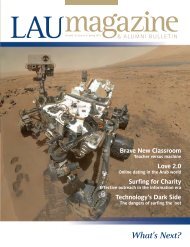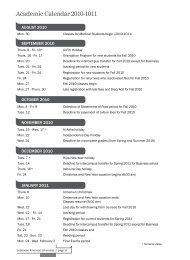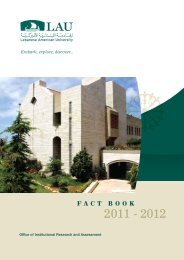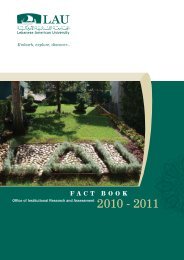academic-catalog2011.. - LAU Publications - Lebanese American ...
academic-catalog2011.. - LAU Publications - Lebanese American ...
academic-catalog2011.. - LAU Publications - Lebanese American ...
You also want an ePaper? Increase the reach of your titles
YUMPU automatically turns print PDFs into web optimized ePapers that Google loves.
Department of Natural Sciences<br />
framework of environmental issues<br />
2. Provide students with enough background<br />
to be able to collect, analyze and formulate<br />
possible solutions to environmental<br />
problems.<br />
3. Provide students with understanding of<br />
the intertwining effects and impacts of<br />
human activities on the world vital natural<br />
resources.<br />
4. Better prepare students for the job market.<br />
LEARNING OUTCOMES<br />
1. Understand the underlying concepts and<br />
principles associated with environmental<br />
science.<br />
2. Identify sources of water, soil and air<br />
pollutants.<br />
3. Demonstrate familiarity with the practical/ field<br />
dimensions of a range of environmental<br />
problems and issues.<br />
4. Understand the interrelationships between<br />
society, economy and environment.<br />
5. Ability to critically review environmental<br />
impact assessment reports.<br />
6. Discuss remediation strategies of a variety<br />
of environmental contaminants.<br />
7. Recognize potential harmful role of human<br />
being in shaping the environment.<br />
MINOR’S REQUIREMENTS<br />
For a Minor in Environmental Science students<br />
must complete a minimum of 18 credits<br />
Core Courses (9 Credits)<br />
ENV200<br />
Introduction to Environmental<br />
Science<br />
3<br />
ENV 402/<br />
CIE525<br />
Environmental Policy and<br />
Management<br />
3<br />
ENV422/<br />
CIE522<br />
Environmental Impact Assessment 2<br />
Elective courses (minimum 9 Credits)<br />
CHM340 Environmental chemistry 3<br />
BIO203* Introduction to Ecology 3<br />
ENV423 Environmental Microbiology 3<br />
CIE424 Water Distribution and Treatment 3<br />
CIE 520 Solid Waste Management 3<br />
CIE585<br />
Risk and Natural Hazard<br />
Management<br />
3<br />
ENV426/<br />
CIE526<br />
Environmental Remediation 3<br />
ENV427 Environmental Physics 3<br />
*May replace ENV200 for engineering students only. Also, it can be<br />
substituted with BIO 331 (Ecology) for biology students. CIE course are<br />
considered as CIE technical electives for civil engineering students.<br />
Graduate Programs<br />
MASTER OF SCIENCE IN<br />
MOLECULAR BIOLOGY<br />
The overwhelming developments and advances<br />
in the fields of medicine, biotechnology, and<br />
the environment are mostly due to the recent<br />
achievements and breakthroughs in the field<br />
of molecular biology, basically through a better<br />
understanding of genetic systems. Molecular<br />
biology methodologies are now employed in<br />
environmental studies, and in remediation<br />
of polluted ecosystems. They have direct<br />
applications in the fields of infertility, hormonal<br />
and immune disorders, and genetic diagnosis and<br />
therapy. They are employed in the production of<br />
new therapeutic drugs, growth factors, vaccines,<br />
foods, and much needed novel bio-molecules.<br />
MISSION<br />
The M.S. in Molecular Biology Program at the<br />
<strong>Lebanese</strong> <strong>American</strong> University gives its students<br />
advanced knowledge and tools for basic molecular<br />
biology investigations and applications.<br />
EDUCATIONAL OBJECTIVES<br />
The purpose of the M.S. in Molecular Biology<br />
Program is to provide students with:<br />
1. Expertise education in molecular and<br />
diagnostic microbiology, nutrition,<br />
physiology, and affiliated medical<br />
disciplines.<br />
2. An opportunity, through biotechnology, to<br />
meet the challenges of the future in the<br />
various fields of applied Biology.<br />
3. Basic research efforts on molecular<br />
biology problems that will advance our<br />
understanding of disease processes, and<br />
the methods for therapy or cure.<br />
4. Updated revolutionary molecular<br />
technologies, and to train them to deal with<br />
the increasing man-made degradation of<br />
the environments.<br />
LEARNING OUTCOMES<br />
Graduates in the M.S. in Molecular Biology will<br />
be able to:<br />
1. Choose appropriate experimental strategy<br />
for research in basic and molecular biology.<br />
2. Collect, quantify, summarize, interpret,<br />
and present biological data.<br />
ACADEMIC CATALOG [ 2011-2012 ] SCHOOL OF ARTS AND SCIENCES<br />
175













